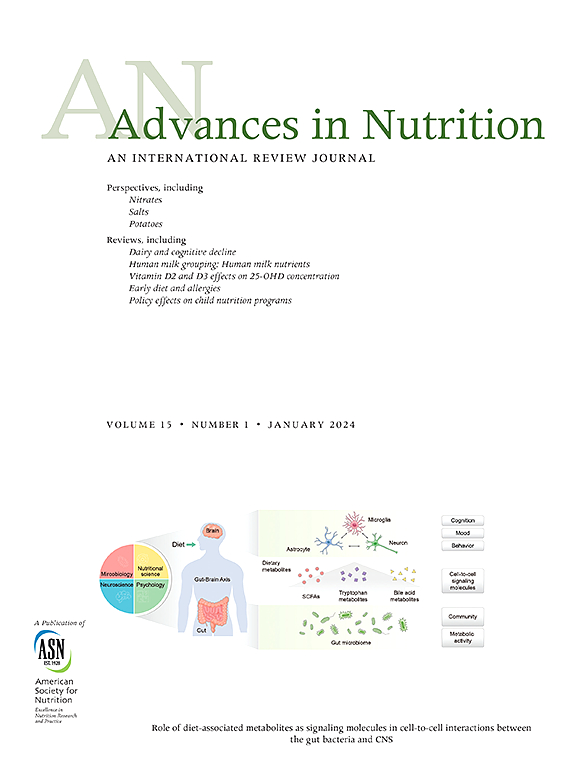关于在营养研究中设计、开展和报告喂养试验的建议。
IF 8
1区 医学
Q1 NUTRITION & DIETETICS
引用次数: 0
摘要
双盲、安慰剂对照、随机对照试验是营养科学临床试验的黄金标准。对于整体膳食试验而言,膳食咨询具有临床可转化性的优势,尽管不同的参与者和不同的研究在预期干预的忠实性方面可能存在差异。喂养试验提供了大部分或全部食物,具有很高的精确性,可以提供概念验证证据,证明膳食干预具有疗效,还可以更好地评估已知数量的食物和营养素对生理学的影响。不过,这些试验在方法上也有其复杂性。喂养试验还需要考虑各种独特的方法论因素,其中最重要的是与设计和向参与者提供饮食有关的因素。本综述旨在全面总结有关设计和开展喂养试验的建议,包括定居和非定居喂养试验。本综述讨论了试验设计和方法的几个相关方面,包括确定研究人群以最大限度地保留研究结果、研究结果的安全性和可推广性、设计对照干预和优化盲法的建议,以及临床人群的具体注意事项。此外,还介绍了菜单设计、开发、验证和交付的详细步骤。这些建议旨在促进方法的一致性和高质量喂养试验的实施,最终促进人们更好地了解饮食在治疗疾病中的作用及其基本机制。本文章由计算机程序翻译,如有差异,请以英文原文为准。
Recommendations for Designing, Conducting, and Reporting Feeding Trials in Nutrition Research
Double-blind, placebo-controlled, randomized controlled trials are the gold standard for clinical trials in nutrition science. For trials of whole diets, dietary counseling is advantageous as they offer clinical translatability although can vary in the fidelity of the intended intervention from participant to participant and across studies. Feeding trials, in which most or all food is provided, offer high precision and can provide proof-of-concept evidence that a dietary intervention is efficacious and can also better evaluate the effect of known quantities of foods and nutrients on physiology. However, they come with additional methodological complexities. Feeding trials also call for a variety of unique methodological considerations, not least of which relate to the design and delivery of diets to participants. This review aims to provide a comprehensive summary of recommendations for design and conduct of feeding trials, encompassing domiciled and nondomiciled feeding trials. Several pertinent aspects of trial design and methodology are discussed, including defining the study population to maximize retention, safety, and generalizability of findings, recommendations for design of control interventions and optimizing blinding, and specific considerations for clinical populations. A detailed stepwise process for menu design, development, validation, and delivery are also presented. These recommendations aim to facilitate methodologic consistency and execution of high-quality feeding trials, ultimately facilitating improved understanding of the role of diet in treating disease and the underpinning mechanisms.
求助全文
通过发布文献求助,成功后即可免费获取论文全文。
去求助
来源期刊

Advances in Nutrition
医学-营养学
CiteScore
17.40
自引率
2.20%
发文量
117
审稿时长
56 days
期刊介绍:
Advances in Nutrition (AN/Adv Nutr) publishes focused reviews on pivotal findings and recent research across all domains relevant to nutritional scientists and biomedical researchers. This encompasses nutrition-related research spanning biochemical, molecular, and genetic studies using experimental animal models, domestic animals, and human subjects. The journal also emphasizes clinical nutrition, epidemiology and public health, and nutrition education. Review articles concentrate on recent progress rather than broad historical developments.
In addition to review articles, AN includes Perspectives, Letters to the Editor, and supplements. Supplement proposals require pre-approval by the editor before submission. The journal features reports and position papers from the American Society for Nutrition, summaries of major government and foundation reports, and Nutrient Information briefs providing crucial details about dietary requirements, food sources, deficiencies, and other essential nutrient information. All submissions with scientific content undergo peer review by the Editors or their designees prior to acceptance for publication.
 求助内容:
求助内容: 应助结果提醒方式:
应助结果提醒方式:


